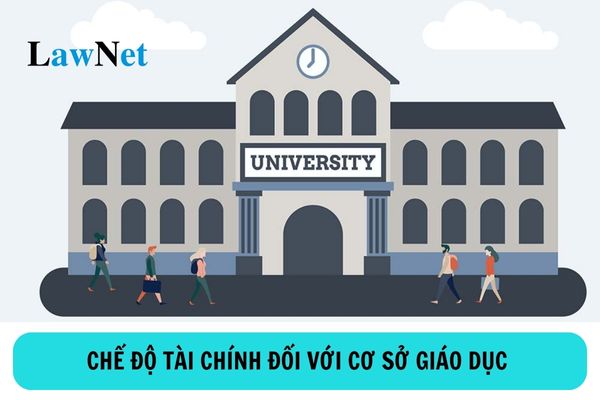Financial Regulations for Educational Institutions in Vietnam
What are the regulations on financial policies for educational institutions in Vietnam?
According to Article 101 of the Education Law 2019, the financial policies for educational institutions are regulated as follows:
- Public educational institutions manage financial revenues and expenditures, the use of assets, pursuant to the provisions of the State Budget Law 2015, the Law on Management and Use of Public Property 2017, and other relevant legal regulations; implement accounting, auditing, tax policies, and financial disclosure in accordance with the provisions of the law.
- Private educational institutions and non-public educational institutions operate on the principle of financial autonomy, implementing accounting, auditing, tax policies, asset valuation, and financial disclosure as stipulated by the law.
The revenues of non-public educational institutions and private educational institutions are used to pay for the activities of the institution, fulfill obligations to the state budget, establish a development investment fund and other funds of the institution, and the remaining portion is distributed to investors according to their capital contribution ratio, except for non-profit educational institutions.
- Educational institutions must publicly disclose the costs of educational and training services and the fee level for each academic year for preschool education, general education; for each academic year and the entire course for vocational education, higher education.

What are the regulations on financial policies for educational institutions in Vietnam? (Image from the Internet)
What information about financial revenues and expenditures must Vietnam's educational institutions disclose?
Based on Article 5 of Circular 09/2024/TT-BGDDT, educational institutions must disclose the following information about financial revenues and expenditures:
- The financial situation of the educational institution for the fiscal year preceding the report period as required by law, including the structure of operating revenues and expenditures as follows:
+ Revenue classified by: Source of funding (state budget, investor support; tuition fees, other fees from students; sponsorships and contracts with external parties; other sources) and type of activity (education and training; science and technology; other activities);
+ Expenditures classified by:
++ Salaries and income (salaries, allowances, increased salaries, and other expenses similar to salaries for teachers, lecturers, managers, staff, etc.);
++ Physical facilities and services (purchases, maintenance, repairs, maintenance and operation of facilities, equipment, service rentals directly serving educational, training, research activities, team development, etc.);
++ Support for students (scholarships, allowances, living assistance, movements, competitions, awards, etc.);
++ Other expenses.
- All revenues and tuition fee levels for students, including tuition fees, other fees and charges, all non-tuition fees and charges (if any) for the academic year and projected for each subsequent academic year or course level of the educational institution before enrollment and admission.
- Policies and annual results of implementing policies regarding allowances and tuition fee exemptions, reductions, scholarships for students.
- Balance of funds as prescribed, including specific funds (if any).
- Other financial disclosure content as required by financial, budgetary, accounting, auditing, and grassroots democracy laws.
What are the regulations on financial management of higher education institutions in Vietnam?
Based on Article 66 of the Higher Education Law 2012 as amended by Clause 34 of Article 1 of the Amended Higher Education Law 2018, the financial management of higher education institutions is regulated as follows:
- Higher education institutions implement financial, accounting, auditing, tax policies, asset valuation, and financial disclosure as provided by law.
- For public higher education institutions that ensure all regular operational costs independently, the school council or university council decides on the financial usage as follows:
+ Decide to use legal revenues outside the state budget for investment in projects related to training, scientific research, and technology transfer activities;
+ Decide on the content and level of expenditure from tuition fees and professional revenues, task assignment, and funding sources, including salaries, professional activities, and management costs as stipulated in the internal spending regulations of the higher education institution.
- Higher education institutions assigned tasks by the State with an accompanying state budget have the responsibility to manage and use state budget resources per legal regulations on public financial and property management.
- The financial surplus between revenues and expenditures from training, scientific, and technological activities of private higher education institutions must allocate at least 25% to invest in the development of the higher education institution, educational activities, infrastructure construction, equipment purchase, faculty and staff training and development, and support student activities and social responsibilities.
For non-profit private higher education institutions, the entire annual financial surplus is collectively owned, indivisible property of the school community for ongoing investment in higher education institution development.
- Annually, higher education institutions must conduct audits and financial disclosures, and the use of financial resources must comply with legal regulations.

